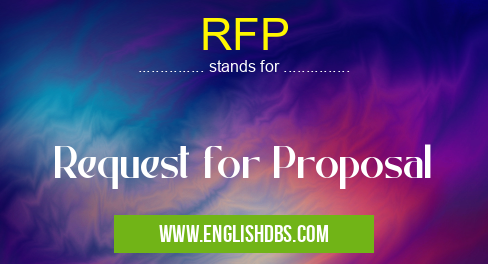What does RFP mean in MANUFACTURING
Request for Proposal (RFP) typically refers to a document issued by an organization in order to solicit bids from vendors who are capable and qualified to meet the specified requirements. This document outlines all relevant details about the project, including scope of work, timeline, payment terms, etc., enabling interested vendors to make an informed decision when submitting their bid. In short, it serves as the starting point for all involved parties in regards to negotiating a mutually beneficial contract.

RFP meaning in Manufacturing in Miscellaneous
RFP mostly used in an acronym Manufacturing in Category Miscellaneous that means Request for Proposal
Shorthand: RFP,
Full Form: Request for Proposal
For more information of "Request for Proposal", see the section below.
Definition
Request For Proposals are documents that state the need and requirements of a specific project or venture. They allow potential suppliers to submit proposals on how they can meet those needs or fulfill those requirements according to the given terms and conditions set forth by the issuing organization. The issuing organization evaluates each proposal and selects one they deem most appropriate and in line with their organizational goals.
Purpose
The primary purpose of RFPs is to ensure that only qualified suppliers have access to business opportunities within an organization. The more precise a request for proposal is formulated, the greater chance there is that interested suppliers will understand what is needed from them and any risks associated with completing the task at hand. This helps organizations avoid misunderstandings between themselves and potential suppliers during negotiations and allows them to get what they need without compromising quality or pricing.
Essential Questions and Answers on Request for Proposal in "MISCELLANEOUS»MANUFACTURING"
What is an RFP?
An RFP or Request for Proposal is a document issued by an organization to solicit bids from vendors in order to identify the most suitable vendor that can fulfill the stated requirements.
What information will I need to prepare an RFP?
Preparing an RFP requires a clear description of the project scope, desired deliverables and timeline, budgeting information, evaluation criteria, and instructions on how vendors should submit their proposals.
How much time do I have to respond to an RFP?
The time frame for responding to an RFP varies depending on the size and complexity of the project. Generally speaking, organizations should allow sufficient time for vendors to carefully consider their proposal and submit it before the stated deadline.
What kind of companies would typically respond to my RFP?
Any company or organization that provides services which fulfill the needs listed in your request are eligible to respond. This may include technology providers, consultants and other professional services firms.
What must I consider when evaluating submitted proposals?
When evaluating submitted proposals, you should consider factors such as price, legal terms and conditions, quality assurance measures, customer service policies, experience with similar projects, references from previous clients and any added value that specific vendor might bring to your project.
Should I provide feedback after receiving responses?
Once you have evaluated all submissions and reached a decision about which vendor is most suitable for your project — it is always good practice to provide feedback on each proposal received. This allows vendors to learn from their experiences in order improve their future submission processes.
Do I need special software in order to create an RFP?
Not necessarily - while there are specialized software applications available such as contract management systems - many organizations use Word/Excel documents combined with PDFs as well as email communication in order to prepare their requests and solicit vendor response.
Are there any legal requirements related to issuing and evaluating an RFP?
Depending on the country/state where you are located - there may be certain regulatory policies or guidelines with regards issuing & evaluating Request For Proposals- so it's best practice to review those first before proceeding with your process.
Is it acceptable if I contact vendors directly outside of my published RFP process?
No — unless there are compelling circumstances that dictate it — all aspects of interactions between yourself & potential vendors should be conducted as part of your published process only.
Final Words:
RFPs are essential tools used in today's corporate environment. By taking advantage of this method, organizations can be sure that their projects are being carried out according to their exact specifications while also making sure they are getting value for money spent on contracting services. It may seem like a lot of work upfront but in reality it saves time and resources over time due its ability to streamline the process of acquiring goods or services.
RFP also stands for: |
|
| All stands for RFP |
